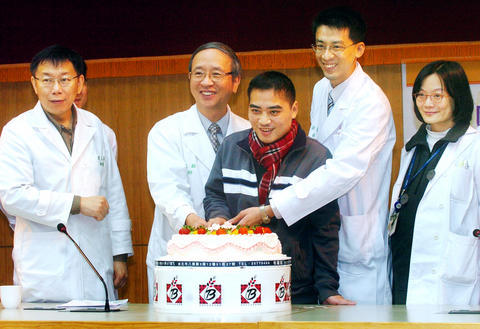Doctors at a local hospital lauded the "miraculous" recovery of a man, who spent a record 117 days on ECMO therapy and will be leaving hospital in time to spend Lunar New Year with his family.
ECMO, or Extracorporeal Membrane Oxygenation, oxygenates blood and removes carbon dioxide from patients whose cardio-pulmonary systems have ceased to function normally.
While the use of ECMOs is relatively common, what made the case unusual was the fact that the patient was kept alive by the system -- usually reserved for short-term life-support measured in days -- for almost four months, doctors at National Taiwan University Hospital (NTUH) said.

PHOTO: CHEN TSE-MING, TAIPEI TIMES
After nearly drowning on July 22 last year, the 26-year-old man surnamed Hu (
"You can see on the X-rays that both sides of his lungs had turned opaque, which means they were permeated with water," said Tsai Keh-sung (
Hu's lung almost completely ceased to function at one point, making it necessary for him to be hooked up to two ECMO machines at the same time.
"The fact that he recovered is something of a miracle," said Lee Yung-chie (
Wang Chih-hsien (王植賢), one of the specialists who tended to Hu, said he estimated the hospital incurred costs of NT$2.5 million on Hu's care in the first month alone.
"The first month is the most expensive as he had to be hooked up to two ECMOs," he said.
The use of ECMOs is covered by the National Health Insurance (NHI), but hospital doctors said that reimbursement by the NHI have to be approved on a case-by-case basis.
"In around 11 percent of cases, reimbursement is denied," said Ko Wen-che (
In such cases the hospital is required to absorb the cost rather than passing it on to the patients.
Although ECMO has been in use for 14 years, the treatment has come under the spotlight in recent years. Many patients' families now request ECMO treatment by name when their loved ones are in critical condition, while others have criticized hospitals for overusing the expensive treatment on unsuitable candidates.
"Deciding whether to treat a patient with ECMO is an agonizing choice," Ko said.
"It's even harder to decide when to turn the ECMO off," Ko said.
About 150 patients were put on ECMO therapy last year at NTUH, more than any other hospital in the world. Sixty survived, a success rate of just 40 percent.
"But without the ECMO, every one of those 60 people would be dead," Ko said.

Taiwanese can file complaints with the Tourism Administration to report travel agencies if their activities caused termination of a person’s citizenship, Mainland Affairs Council Minister Chiu Chui-cheng (邱垂正) said yesterday, after a podcaster highlighted a case in which a person’s citizenship was canceled for receiving a single-use Chinese passport to enter Russia. The council is aware of incidents in which people who signed up through Chinese travel agencies for tours of Russia were told they could obtain Russian visas and fast-track border clearance, Chiu told reporters on the sidelines of an event in Taipei. However, the travel agencies actually applied

Japanese footwear brand Onitsuka Tiger today issued a public apology and said it has suspended an employee amid allegations that the staff member discriminated against a Vietnamese customer at its Taipei 101 store. Posting on the social media platform Threads yesterday, a user said that an employee at the store said that “those shoes are very expensive” when her friend, who is a migrant worker from Vietnam, asked for assistance. The employee then ignored her until she asked again, to which she replied: "We don't have a size 37." The post had amassed nearly 26,000 likes and 916 comments as of this

New measures aimed at making Taiwan more attractive to foreign professionals came into effect this month, the National Development Council said yesterday. Among the changes, international students at Taiwanese universities would be able to work in Taiwan without a work permit in the two years after they graduate, explainer materials provided by the council said. In addition, foreign nationals who graduated from one of the world’s top 200 universities within the past five years can also apply for a two-year open work permit. Previously, those graduates would have needed to apply for a work permit using point-based criteria or have a Taiwanese company

The Shilin District Prosecutors’ Office yesterday indicted two Taiwanese and issued a wanted notice for Pete Liu (劉作虎), founder of Shenzhen-based smartphone manufacturer OnePlus Technology Co (萬普拉斯科技), for allegedly contravening the Act Governing Relations Between the People of the Taiwan Area and the Mainland Area (臺灣地區與大陸地區人民關係條例) by poaching 70 engineers in Taiwan. Liu allegedly traveled to Taiwan at the end of 2014 and met with a Taiwanese man surnamed Lin (林) to discuss establishing a mobile software research and development (R&D) team in Taiwan, prosecutors said. Without approval from the government, Lin, following Liu’s instructions, recruited more than 70 software